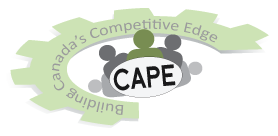INTRODUCTION TO EMPLOYMENT ADVISORY AND TOOLS.
Migrants with engineering and other professional international credentials arrive in Canada aspiring to improve their lives and further their professions. However, on arrival, they are confronted with inadequate, inaccurate and confusing labor market information and employment supports that do facilitate their entry into jobs that are commensurate with their skills and credentials.
Some important facts you need to know before you begin to use the tools provided in this section include:
- Not all jobs in the professions require you to have a license to practice. 80% of jobs that require engineering degrees for instance do not require a Professional Engineer (P.Eng) License but this is not the case for many other professions such as medicine for which a license is a necessity for entry to practice.
- In 2003, over 4,400 students graduated with Canadian engineering degrees and over 7,100 immigrants with engineering degrees entered the job market yet only around 2,200 (or 1 in 5) in total applied for the P.Eng. license. This has put to test the need for licensing by Professional Engineers Ontario (PEO) and this regulator has been reviewing its regulatory framework for internationally trained engineers as well as improving labor mobility.
- You can easily spend several years and thousands of dollars trying to acquire a Professional License and in the end find that getting employed as a professional in Canada is impossible
- 60 – 70% of skilled migrants with professional backgrounds applying for a Professional license can navigate the whole regulating process except for the 12 month in-Canada work experience in the form of paid internships, articles, clinical practice or supervised experience so many of them never get to practice their profession in Canada
- You will find many services available to you when you land in Canada (e.g. language support, bridging programs, employment preparation courses, sector, terminology, information and counseling programs etc.) but you may not need to use any or all of them!
CAPE has carried out extensive research on the employment needs of Internationally Educated Professionals (IEPs). Through this research, CAPE has been able to establish useful employment support tools that can assist you to make more effective and informed career choices. This support is valuable because it saves you a lot of time, energy and resources by giving you the most up-to-date information about what you will need in order to get employed in Ontario and Canada. This employment advisory begins with a self-assessment and career planning tutorial. This self-assessment is important as it puts the power to decide which services you need in your hands.
Other employment support tools in this section include a unique online portfolio builder in standardized terminology that allows you to generate a resume and customized skills-gaps reports that can help you to create a career development plan for employment transition.
